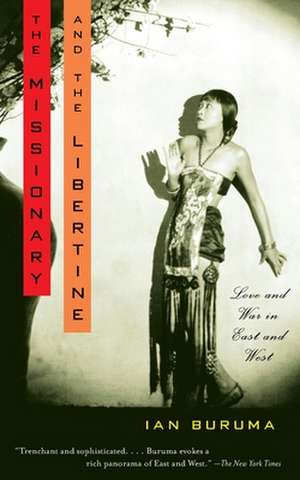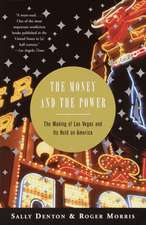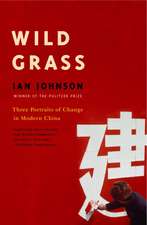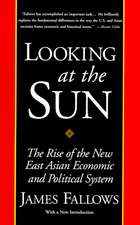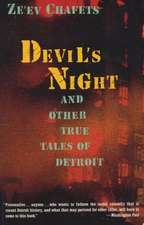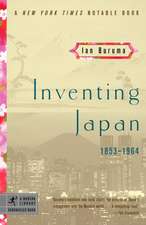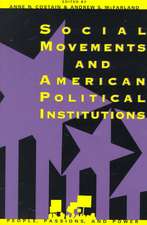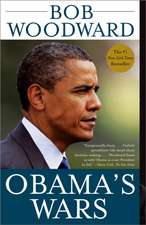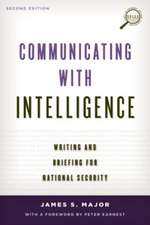The Missionary and the Libertine: Love and War in East and West
Autor Ian Burumaen Limba Engleză Paperback – 31 iul 2001
Vezi toate premiile Carte premiată
L.A. Times Book Prize (2000)
At home in both worlds, Buruma traverses the realms of journalism, literary criticism, and political analysis, to examine the dialogue of fact and fantasy that affects our perception of far-away lands. Whether deconstructing the films of Satyajit Ray or the novels of Yoshimoto Banana, Buruma offers a splendid counterbalance to fashionable theories of clashing civilizations and uniquely Asian values. In twenty-five illuminating, often humorous essays, The Missionary and the Libertine shows us why Buruma’s reputation for writing the most compelling commentary on the faultlines of the East-West divide is so secure.
Preț: 114.09 lei
Nou
Puncte Express: 171
Preț estimativ în valută:
21.83€ • 22.71$ • 18.03£
21.83€ • 22.71$ • 18.03£
Carte disponibilă
Livrare economică 22 martie-05 aprilie
Preluare comenzi: 021 569.72.76
Specificații
ISBN-13: 9780375705373
ISBN-10: 0375705376
Pagini: 352
Dimensiuni: 127 x 203 x 20 mm
Greutate: 0.4 kg
Editura: Vintage Publishing
ISBN-10: 0375705376
Pagini: 352
Dimensiuni: 127 x 203 x 20 mm
Greutate: 0.4 kg
Editura: Vintage Publishing
Recenzii
“Trenchant and sophisticated…. Buruma evokes a rich panorama of East and West.”–The New York Times
“Eclectic and intimate.”–Talk
“Buruma has dizzying freewheeling powers of observation.”–Los Angeles Times
“Eclectic and intimate.”–Talk
“Buruma has dizzying freewheeling powers of observation.”–Los Angeles Times
Notă biografică
The author of five previous books, Ian Buruma lives in London.
Extras
The Missionary and the Libertine
I first saw the East in 1971. The East is of course a vague notion, for it is imaginary as much as geographical or historical. I am concerned here with the imaginary East. In 1971 a Japanese theater group called the Tenjo Sajiki came to Amsterdam, where I was living at the time. The group was led by the writer/director Terayama Shuji. He had hawkish eyes and short-cropped hair, brushed forward like Napoleon's, and he wore high-heeled ladies' slippers. The Tenjo Sajiki was playing at the Mickery Theater.
Groups from all over the world performed at the Mickery. Located in the center of Amsterdam, on a wide street that had once been a canal, the Mickery had become the headquarters of the international avant-garde, a kind of United Nations of world theater. I don't know whether it was due to the genius of its owner, a burly bald-headed man called Ritsaern ten Cate, or to the spirit of the time, but the Mickery was where the action was. In 1971 the Mickery audience was ready for anything.
Terayama's new play was called Opium War It had been raining on the day I went to see it. The streets were glistening in the moonlight, and misty drizzle formed yellow cones under the old-fashioned street lamps. The Tenjo Sajiki took full advantage of the Mickery; all the rooms were used, as well as the courtyard round the back of the theater. An actor in Chinese costume stood outside, softly strumming a guitar. Another actor, with an evil leer, stood in a corner of the courtyard, stroking the blue-green feathers of a rooster. A girl in a silk dress appeared, beckoning us to come in. She had a candle in her right hand and led us through a long, dark passage, at the head of which I could hear people singing, as well as what sounded vaguely like fairground music: an electric bass guitar and an organ.
Inside was a world I had never seen before. I cannot remember what the story was, or even whether there was a story. We were swept along in Terayama's play, from room to room. Sometimes the rooms were lit, sometimes they were dark. An actor's face would be revealed quite suddenly by the light of a match, and then disappear. There was a slave market, with naked girls and handsome pimps; there was an opium den, thick with incense and smoke; there was a ritual killing of a chicken. Men were dressed as gorgeous women, and women were dressed as men. In one room a girl in a sailor suit was bent over a chair and was having her bottom spanked in slow motion by a man wearing a top hat. A ventriloquist in bone-white makeup was sticking pins into a replica of himself There were huge pictures of Japanese comic-book figures on the walls; there were street signs in Chinese and Japanese; there were circus posters of fat ladies, snake charmers and freaks.
Weird rock music and scratchy songs from the 1930s formed a constant musical background to the actors' words, which nobody understood: the words were pure sound, just as the Chinese characters on the walls were pure design. In the end we found ourselves in one large room, which was like a fantastic brothel, filled with girls, midgets, opium-smokers, dandies and drag queens. The music was delirious, the singing mesmerizing. And then, in an instant, it was over: the actors and actresses were gone, the scenery had come crashing down and lay in piles on the floor, the lights came on, and the Mickery Theater was no more than a large, messy warehouse. The smell of incense lingered a bit longer, and my ears were still ringing from the sounds of music and text. Walking home on the wet Amsterdam streets, along the rank-smelling canals, the images danced on in my mind.
Three nights later I went to the Mickery again, and then again. During the days I would drop in at the theater cafe, where members of Terayama's troupe hung out between rehearsals. They read comic books and fashion magazines, and played pinball, and discussed the day's shopping, and cracked jokes in a language I could not understand. I was like a child who has sneaked into the caravan park behind the circus tent, to watch the acrobats and clowns and lion tamers gossiping, cleaning up, eating and drinking, or taking naps. Even without the greasepaint and costumes, Terayama's performers had lost none of their magical attraction. If this is what Tokyo is like, I thought, I want to join the circus.
I was studying Chinese at the time. But China, still in the grip of the Cultural Revolution, with its model operas and its campaigns against capitalist roaders, was not only grim but so remote as to be almost abstract. Unless you were a Friend of the People, it was difficult to visit China, and the prospect was, in any case, not inviting. China in 1971 was so distant it did not seem of this world, yet it was not exotic. Mao's China, to me, seemed like an extreme version of something any student of European history could recognize: a state driven by uniformity, orthodoxy, puritanism.
To some people this was part of China's attraction. Mao's regime offered the promise of a purer, cleaner, better world, a vision of heaven after purgatory-or was it purgatory before heaven? Maoism was a utopian religion masquerading as politics. China under Mao appeared to its Western supporters in the way imperial China must have appeared to Voltaire, as a rational paradise on earth. China was an idea. Chinese people were statistics-variables in agricultural experiments, mass political campaigns, macroeconomic data. The appeal of China could not be sensual, because the realm of the senses had been demolished. But China did have an aesthetic appeal: to misguided enthusiasts, the Chinese order had the beauty of mathematics.
Japan, on the other hand, as I saw it in Terayama's theater, was utterly fantastic, yet closer to the world I knew and lived in. The actors wore the same clothes as we did, listened to the same music, smoked the same drugs. But at the same time their world seemed more exotic than the China I read about in the People's Daily. This was partly because of Terayama's style: he mixed Western and Japanese imagery in a way that made both West and East look bizarre and marvelous. His Japan was like a great, colorful souk, or like a costume party in which the guests tried on this costume and then that--old, new, Japanese, Chinese, European. They did so playfully, freely, following only the whims of their imagination. Everything in Terayama's theater was opposed to dogma, orthodoxy and puritanism. He made Japan look sexy If Mao's version of "Asiatic despotism" appealed to religious puritans, Terayama's Japan was the modern version of a sensual Orient that has attracted libertines and appalled missionaries for centuries. Neither puritanism nor sensuality was ever unique to East or West, yet, on the whole, it is for the latter that Westerners have looked East. There has been a sensual, even erotic, element in encounters-imaginary or real-between East and West since the ancient Greeks. The European idea of the Orient as female, voluptuous, decadent, amoral-in short, as dangerously seductive-long predates the European empires in India and Southeast Asia.
In The Bacchae, Euripides portrays Dionysus as a fearsome Asiatic god. And in The Persians, Aeschylus shows the Orient to be a dangerous place. The gist of the play is that "Rationality is undermined by Eastern excesses, those mysteriously attractive opposites to what seem to be normal values" (Edward Said, Orientalism). About The Bacchae, Said remarks that "The difference separating East and West is symbolized by the sternness with which, at first, Pentheus rejects the hysterical bacchantes."
Aphrodite was modeled after Astarte, the Whore of Babylon. Even though the Greeks worshipped Aphrodite, she never quite shed her foreign, Asiatic origins; she kept her slightly scandalous reputation as the divine patroness of temple prostitutes, which is why the Church fathers called her a whore, and Emperor Constantine, in an early instance of missionary zeal, smashed her temple at Baalbek and built a church in its stead.
In The Lotus and the Robot, a book about India and Japan, Arthur Koestler describes his first reaction to "Lotusland" (i.e., Japan) as one of .sensuous and sensual delight." Japan, he writes, has "an atmosphere with an erotic flicker like the crisp sparks from a comb drawn through a woman's hair-a guilt-free eroticism which Europe has not know since antiquity."
These are only perceptions, of course, not exact reflections of reality. In fact, Amsterdam, where I saw Terayama's bacchantes perform, was in many respects more of a Lotusland than Tokyo. It was certainly more "Orientalist," with its fashion, among young people, for hashish, incense, patchouli oils and Indian frou-frou. Yet Koestler's first impression of Tokyo was similar to that of many Western travelers, some of whom decided to stay. It is easy to imagine the giddy sense of freedom felt by Englishmen from rainy northern towns, or Americans from God-fearing midwestern plains, when they came to Japan, or Thailand, or Ceylon, or wherever their idea of Arcadia happened to be. Because local restraints did not apply to them, and they were far from home, everything suddenly seemed possible. The American writer Donald Richie arrived in Japan in 1945. The last words of his loving travelogue The Inland Sea are "I don't care if I never go home." And he never did.
For centuries the East, like the Mediterranean countries, represented the sunny, pagan, hedonistic alternative to the cold, pinched and dreary climate of the Christian, especially Protestant, West. Many British writers sought permanent or temporary refuge in India, the Middle East, China or Capri. All over Southeast Asia and Japan there are self-made Arcadias, built by European or American exiles from their native puritanism. In Bangkok, Macao or Kobe, they look curiously alike: gorgeously decorated with Asian art and antiques, fenced in by gardens of bamboo, and with handsome young men or (less often) young girls in attendance.
The purest example of an exile in Arcadia I ever came across was actually someone I never met. By the time I became aware of him, he was already dead. I found him in a university library, not long after I first went to Japan as a student, in 1975. The library was closed to Japanese students, because campus radicals had occupied it some years before, but foreign students were allowed in. I found myself browsing through the stacks with another student, an English artist. We soon noticed not only that the selection of English books reflected a very particular taste, but that virtually all the books had belonged to one man. I cannot remember his name-it was something like Edward Postlethwaite. From dates and place names inscribed in his books, it was clear that he had lived in Berlin until 1936, after which he moved to a fishing village a hundred miles south of Tokyo.
Postlethwaite had a taste for such fin-de-siecle curiosities as accounts by obscure countesses of the Oscar Wilde they had known. There were first editions of Aubrey Beardsley, J.-K. Huysmans, and Ronald Firbank. Photographic books of naked German youths, sitting on rocks or on mountaintops, squinting into the sun, abounded. He also liked Greek myths, Nordic legends (a handsome edition of Wagner's Ring of die Nibelungen) and Japanese folktales (the complete works of Lafcadio Hearn).
But the book that caught my particular attention was not a precious literary curio but a volume of short stories by Somerset Maugham. The reason was Postlethwaite's scribbling. He had the habit of writing remarks in the margins ("good!", or, sometimes, "absolute rot!"). He also underlined passages he particularly admired. There was one such passage in a story about a British planter in Malaya. The planter is visited by another Englishman, evidently a rare occasion, for the plantation is in a remote part of the country. The two men are having drinks on the verandah after sundown. The night is silent apart from the odd animal crying out. The visitor asks his host how he can stand the loneliness of his life, without the company of fellow white men. That, says the planter, is precisely why he likes it out there. The sentence was underlined in thick red ink. I tried to imagine Postlethwaite's house in the Japanese fishing village: the books, the bamboo fence, the young boys.
The sexual attraction of the East is, of course, a complex thing, which cannot be explained only by the attraction of "guilt-free" eroticism to men or women burdened by Christian guilt. Power and domination have much to do with it. The image of the "geisha girl"-submissive, pliable, ready to indulge any fancy--dovetails neatly with the old perception of the East as a passive, feminine receptacle of masculine Occidental vigour. It is surely not for nothing that nineteenth-century French painters of Orientalist themes were fascinated by harems and slave markets. Modern Japanese pornography is dominated (if that's the right word) by sadomasochism. When Western men-black or white-appear in this material, it is usually as brutal masters. This is for the Japanese market, of course, but the fantasies conform to the Orientalist types.
The idea of the East as being more refined, more elegant than the West, of the geisha girl as the mistress of exquisite erotic arts, fits in too. To be raffine is close to being decadent. To be coarse is to be forceful and virile. But there is an alternative vision of the Oriental, which is admittedly somewhat old-fashioned these days: the child of nature. Guiltless eroticism is associated with the noble savage, the beautiful, simple, human creature whose mind is uncluttered by moral and intellectual complexity. It is still possible, in certain circles, to hear the Japanese described as "Innocent." This means, of course, innocent of the Christian idea of sin. On this point, missionary and libertine would agree: the difference is that one finds deplorable what the other adores.
I first fell in love with a Japanese girl in the movies. She was a character in Domicile conjugal, a film by Francis Turnout. Or rather, she was not really a character at all: she was a phantom, a fantasy, a catalyst to enable the French characters to reveal themselves. A young man in Paris is married to a young Frenchwoman. Their life is a study of bourgeois French domesticity. Then the young man meets a beautiful Japanese woman. She is mysterious and exotic--everything his life is not. The young man falls in love with her. She prepares exquisite food for him. They have sex without guilt. But he never gets to know her. They are incapable of having a meaningful conversation. She remains as silent and elusive as a ghost. Finally he realizes that life with her is unreal, in fact unbearable, and goes back to French domesticity.
The French marriage, then, as shown in Turnout's film, is real. The Japanese girl represents a flight from reality, a dream. But, as I said, I was enchanted. This was in 1972. While writing this piece, twenty-three years later, I decided to see the film again, so I bought the video. I was still enchanted. Then, a week or so after that, I was invited to judge a program of Japanese films in France. And there, among my fellow jurors, she was: Hiroko. Although no longer young, she had hardly changed: a Japanese Parisienne, or a Parisian fantasy of Japanese womanhood. I told her my story. She smiled, and said in a soft, lilting voice, "You're not the first one, you know."
I don't know whether Truffaut believed that communication between a Frenchman and a Japanese woman was impossible beyond a superficial level, but, for the sake of the film, he had to assume so. And the same might be true of Postlethwaite and his fellow escapees from Western life-the Orientalists, the "rice queens," the romantics in search of Lotusland. It is a mark of the romantic that he or she seeks the unreal. The point of going East is not to find oneself, as so many hippie seekers thought, but to get rid of oneself-or at least those aspects of oneself one does not like.
But Lotusland exacts its price, for seekers after guilt-free sex do not always manage to shed their own sense of guilt. After the sensual charms wear off, or are taken for granted, a peculiar censoriousness sometimes sets in, and the East is denounced for its lack of universal values, its frivolousness, its amorality. All of a sudden the libertine becomes a missionary; the moralism he thought he had shed is deflected on to his hosts. In Japan, Koestler speaks of a "first phase" (of delight) and subsequent negative "phases." He notes that with some Westerners the first phase can last a lifetime, but that with others soured delight can result in permanent hatred. In fact, in my experience, many Westerners in Japan veer between the poles of love and hate so fast it can cause a kind of mental seasickness. When that happens, it is best to leave. You only need to study the letter columns in the English-language press in Tokyo to see what bitterness mental nausea can cause.
The struggle between missionary and libertine goes beyond the psychology of individuals. Or, to put it in another way, the personal and the political intersect. The very notion of an alternative world, a haven of hedonism, an amoral Arcadia, is a provocation to authoritarians anywhere. Even if that alternative world is an illusion, it must be stamped out, reformed or censored. Astarte's temple prostitutes of West Asia were an affront to the Byzantine empire, just as Indian temple dancers later shocked the missionaries of the British empire. Sexual freedom and political heterodoxy are closely linked in the authoritarian mind, for good reasons. If you believe in absolutism-political or moral-an alternative cannot be allowed to exist.
This is where the dichotomy of East and West breaks down. Every society has it missionaries and its libertines. Papuas of Irian Jaya used to dismay dignitaries from Jakarta by greeting them at the airport dressed in little but their erect and elongated penis-sheaths. They were told to dress in the future like respectable Indonesians. But the Papuans were not so easily cowed. The next time a government representative arrived in Jayapura he was greeted by a line of half-naked men with their sheaths displayed in full splendor. But on their tips fluttered the red and white colors of the Indonesian flag. Islamic, let alone Christian, morality was not what drove the Indonesian missionaries. In their view, the continuation of "primitive" Papuan customs posed a threat to order in the Javanese empire. Flags flying from penis-sheaths were a demonstration of liberty from the "normal values" of the state.
What is normal, in the eyes of officialdom, changes with time. So do perceptions of the outside world and indeed of missionaries. At the end of the sixteenth century the Japanese shogun Hideyoshi persecuted Jesuit missionaries because they were turning too many Japanese heads: the attraction of Christ was a threat to orthodoxy and public order. But the autocratic politicians who ruled Japan three hundred years later imitated aspects of European puritanism. By then Europeans ruled much of the East, as "muscular Christians" carrying the white man's burden. The hedonism of British libertines in eighteenth-century India had withered with the advent of a new breed of colonizer, particularly the memsahibs among them. By the mid-nineteenth century the images of East and West had hardened: the West was virile, dynamic, expansive, disciplined, and the East was indolent, decadent, pleasure-loving, passive. In 1885 the editors of a Japanese newspaper wrote, "If a Japanese be compared with an Englishman or an American, it is not necessary to go very deep into the subject to discover who is the more industrious, better educated, more courageous and more intelligent. What a difference there is between Japan and either England or the United States in strength, wealth and civilization."
Some Japanese in the nineteenth century believed that Christianity was the unifying force that gave Europeans their vigor and discipline. This inspired them to come up with a muscular creed of their own: state Shinto. It was designed to promote absolute obedience to the emperor, as the divine embodiment of ancient Japanese values. Its official promoters were the new missionaries, who appealed to tradition while at the same time purging Japan of its supposedly decadent past. Their efforts were cultural as well as political. The Kabuki theater and other arts of the old world of licensed hedonism were cleaned up and became academic expressions of national tradition. Public nudity was to be discouraged-even the "sacred nudity" in traditional Shinto ceremonies of nature worship. State Shinto had to be clean and patriotic, just like muscular Christianity.
In the introduction to a book of photographs of Shinto festivals, called Naked Festival, Mishima Yukio once wrote that in the Meiji era of so-called Civilization and Enlightenment (1868-1912)
Japan tried to deny her past completely, or at least to hide from Western eyes any of the old ways that might persist despite all efforts to eradicate them. The Japanese were like an anxious housewife I e preparing to receive guests, hiding away in closets common articles of daily use and laying aside comfortable everyday clothes, hoping to impress the guests with an immaculate, idealized life of her household, without so much as a speck of dust in view.
It was not only to impress the guests, however, that the Meiji patriarchs behaved like puritanical housewives: it was also because they thought that, for Japan to be as powerful as the West, Japanese had to behave like Westerners-or at least like Westernized Japanese. Similar ideas arose in other parts of Asia. In India, Swami Vivekananda (1863-1902) believed that Hindus should reinvigorate themselves through the three Bs: beef, biceps and Bhagavad-Gita. This was his answer to muscular Christianity. King Rama VI of Thailand, who was educated at Sandhurst, led a Boy Scout movement, promoted European dress for women, designed a national flag, introduced the Gregorian calendar and wrote poems to promote a vigorous nation:
Let us unite our state, unite our hearts, into a great whole. Thai-do not harm, or destroy Thai, But combine your spirit, and your strength to preserve the state So that all foreign peoples Will give an increasing respect.
The extreme phase of Occidentalism did not last very long in Thailand or Japan, nor was its effect as deep or pervasive as some of its boosters might have hoped. And not all Western ideas were puritanical. During a brief period in the Roaring Twenties, Japan not only came close to democratic government, but an East-West cocktail of libertinism, characterized as ero, guro, nansensu (erotic, grotesque, nonsense), set the tone in metropolitan cultural life.
Missionary zeal, nonetheless, had not disappeared. The creed of muscular Japaneseness returned with the authoritarian regimes of the 1930s and early 1940s. And, just as conquest of the East by European nations had gone hand in hand with a mission civilisatrice, undertaken by promoters of "universal" Western values, the Japanese conquest of Asia came with a mission to spread Japanese imperialist values. This time Asia was to be civilized by missionaries from the East. The pattern of East-West imagery had not changed: Japan had simply become an honorary member of the West. Japan was full of masculine energy, while China was regarded as a supine, decadent, indolent, passive country, waiting to be disciplined by a more vigorous race.
The Japanese mission failed, but it helped to bring the European empires to a speedier end. Once the weakness of Western powers had been exposed, the elaborate facade of their muscular invincibility began to crumble. The European mission civilisatrice did not outlast the Japanese empire for long. It was replaced by the Pax Americana, which in its early postwar stage was still driven by vigorous optimism, only to droop badly after the war in Vietnam. That war, which sapped so much American energy, inspired a whole new generation of missionaries and libertines. "Saigon ... shit," the first two words of Francis Ford Coppola's Apocalypse Now), summed up the ancient view of the East as a wicked swamp of iniquity, waiting to suck Westerners into its rotting depths. Saigon was glamorous and corrupt, destroyed by the white man, and destroyer of white men. It might have been shit, but it was seductive shit.
Roughly since the fall of Saigon, however, an astonishing reversal has taken place in Asia. From the official point of view of China, Singapore, Malaysia, South Korea and Japan, Europe and the United States are now models not of masculine vim but, on the contrary, of decadence, libertinism and sloth. Spokesmen for so-called Asian values extol the superior discipline, vigor and industriousness of the East. Now it is the turn for individual Asians to seek liberty and pleasure in the West. And, just as Asian nationalists once copied the muscular virtues of Western imperialism, some conservatives in the West today dream of cracking Occidental libertines with an Oriental whip.
There is in fact nothing peculiarly Asian about Asian values. What the likes of Lee Kuan Yew call Asian values are more or less the values they were taught by their colonial schoolmasters in the days when Kuan Yew was still called Harry, The white man's burden has been covered with a Confucian sauce. When George Brown visited Singapore in the 1960s as British foreign secretary, he was harangued by Lee Kuan Yew about the rotten state of Britain. When Lee had finished, Brown said (or is said to have said), "Harry, you're the finest Englishman east of Suez."
Mahathir Mohamad, the prime minister of Malaysia, is quite open about the provenance of his Asianist propaganda. He has recalled how the Englishmen of his youth wore their collars and ties even in the sticky heat of a Malayan summer. To him this was a sign of superior discipline and propriety-what made the British great. Now in Britain he sees only sloppy permissiveness, which, if Eastern leaders such as himself are not careful, will sap the vigor of the more youthful East. He writes in his book, entitled The Challenge (a whiff of Newbolt or Baden-Powell here), "Just as copying proper attire once led to the East adopting Western values regarding discipline, copying improper attire has infected the East with the values behind the change in attire."
The missionaries, then, have taken post in Kuala Lumpur, and the whores of Babylon have moved to London and New York. This is how promoters of Asian values explain the rise of East Asia and the decline of the West. Now it would be foolish to deny that many parts of East Asia are fizzing with economic energy, and that many Western nations are hampered by complacency. But does this mean that the missionaries are right? Is the West being corrupted by too much individual liberty? And are collective discipline and individual repression the keys to the East Asian renaissance?
Not necessarily. Hard work and discipline are vital conditions for human achievement. But the energy that produced the Western empires had to do less with puritanical values than with political and economic liberties. The weakness of Asia in the nineteenth century was less a matter of lax morals and too much freedom than of archaic political institutions and too little freedom. Empires were not built on muscular Christianity, but they were later justified by it. The promoters of Asian values today are doing what missionaries, whether "Asian" or "Japanese" or "Christian," have always done: they use values to justify their masters' power.
I arrived in the East as a libertine, beckoned by Terayama's theater from Tokyo. I have tried to resist the enticements of the missionaries, from East or West, though not always with success: the role of the moralist can be a satisfying one. Yet the life of the libertine has its pitfalls too. For the whole point of Arcadia is to cut oneself off from the world. Those who get stuck in Arthur Koestler's "first phase" of delight are blind to the dark sides of their East, wherever it may be, for Arcadia, by definition, has no shadows. I have never renounced the sensual delights of the first phase-indeed, some of my writing was done in a spirit of celebration of them. At the same time I have tried to write, as a critic, not only of the books and films at hand but also of the ideas and events that were current at the time.
I can't claim to have been completely consistent. I changed my mind on several things. When I lived in Japan I tended to agree with Japanese cultural experts that much about Japan was unique. Experience in the rest of Asia, and, later, back in Europe, taught me otherwise. I turned out to be wrong about other things too: Cory Aquino did better than I thought she would; Japanese politics proved to be less rigid than I thought it was. Yet, apart from some pruning and the correction of factual errors, I have not revised these texts, since I did not want to kill the freshness of impressions and observations with the questionable wisdom of hindsight. For only a missionary can believe that once the correct line has been revealed the truth is established forever.
I first saw the East in 1971. The East is of course a vague notion, for it is imaginary as much as geographical or historical. I am concerned here with the imaginary East. In 1971 a Japanese theater group called the Tenjo Sajiki came to Amsterdam, where I was living at the time. The group was led by the writer/director Terayama Shuji. He had hawkish eyes and short-cropped hair, brushed forward like Napoleon's, and he wore high-heeled ladies' slippers. The Tenjo Sajiki was playing at the Mickery Theater.
Groups from all over the world performed at the Mickery. Located in the center of Amsterdam, on a wide street that had once been a canal, the Mickery had become the headquarters of the international avant-garde, a kind of United Nations of world theater. I don't know whether it was due to the genius of its owner, a burly bald-headed man called Ritsaern ten Cate, or to the spirit of the time, but the Mickery was where the action was. In 1971 the Mickery audience was ready for anything.
Terayama's new play was called Opium War It had been raining on the day I went to see it. The streets were glistening in the moonlight, and misty drizzle formed yellow cones under the old-fashioned street lamps. The Tenjo Sajiki took full advantage of the Mickery; all the rooms were used, as well as the courtyard round the back of the theater. An actor in Chinese costume stood outside, softly strumming a guitar. Another actor, with an evil leer, stood in a corner of the courtyard, stroking the blue-green feathers of a rooster. A girl in a silk dress appeared, beckoning us to come in. She had a candle in her right hand and led us through a long, dark passage, at the head of which I could hear people singing, as well as what sounded vaguely like fairground music: an electric bass guitar and an organ.
Inside was a world I had never seen before. I cannot remember what the story was, or even whether there was a story. We were swept along in Terayama's play, from room to room. Sometimes the rooms were lit, sometimes they were dark. An actor's face would be revealed quite suddenly by the light of a match, and then disappear. There was a slave market, with naked girls and handsome pimps; there was an opium den, thick with incense and smoke; there was a ritual killing of a chicken. Men were dressed as gorgeous women, and women were dressed as men. In one room a girl in a sailor suit was bent over a chair and was having her bottom spanked in slow motion by a man wearing a top hat. A ventriloquist in bone-white makeup was sticking pins into a replica of himself There were huge pictures of Japanese comic-book figures on the walls; there were street signs in Chinese and Japanese; there were circus posters of fat ladies, snake charmers and freaks.
Weird rock music and scratchy songs from the 1930s formed a constant musical background to the actors' words, which nobody understood: the words were pure sound, just as the Chinese characters on the walls were pure design. In the end we found ourselves in one large room, which was like a fantastic brothel, filled with girls, midgets, opium-smokers, dandies and drag queens. The music was delirious, the singing mesmerizing. And then, in an instant, it was over: the actors and actresses were gone, the scenery had come crashing down and lay in piles on the floor, the lights came on, and the Mickery Theater was no more than a large, messy warehouse. The smell of incense lingered a bit longer, and my ears were still ringing from the sounds of music and text. Walking home on the wet Amsterdam streets, along the rank-smelling canals, the images danced on in my mind.
Three nights later I went to the Mickery again, and then again. During the days I would drop in at the theater cafe, where members of Terayama's troupe hung out between rehearsals. They read comic books and fashion magazines, and played pinball, and discussed the day's shopping, and cracked jokes in a language I could not understand. I was like a child who has sneaked into the caravan park behind the circus tent, to watch the acrobats and clowns and lion tamers gossiping, cleaning up, eating and drinking, or taking naps. Even without the greasepaint and costumes, Terayama's performers had lost none of their magical attraction. If this is what Tokyo is like, I thought, I want to join the circus.
I was studying Chinese at the time. But China, still in the grip of the Cultural Revolution, with its model operas and its campaigns against capitalist roaders, was not only grim but so remote as to be almost abstract. Unless you were a Friend of the People, it was difficult to visit China, and the prospect was, in any case, not inviting. China in 1971 was so distant it did not seem of this world, yet it was not exotic. Mao's China, to me, seemed like an extreme version of something any student of European history could recognize: a state driven by uniformity, orthodoxy, puritanism.
To some people this was part of China's attraction. Mao's regime offered the promise of a purer, cleaner, better world, a vision of heaven after purgatory-or was it purgatory before heaven? Maoism was a utopian religion masquerading as politics. China under Mao appeared to its Western supporters in the way imperial China must have appeared to Voltaire, as a rational paradise on earth. China was an idea. Chinese people were statistics-variables in agricultural experiments, mass political campaigns, macroeconomic data. The appeal of China could not be sensual, because the realm of the senses had been demolished. But China did have an aesthetic appeal: to misguided enthusiasts, the Chinese order had the beauty of mathematics.
Japan, on the other hand, as I saw it in Terayama's theater, was utterly fantastic, yet closer to the world I knew and lived in. The actors wore the same clothes as we did, listened to the same music, smoked the same drugs. But at the same time their world seemed more exotic than the China I read about in the People's Daily. This was partly because of Terayama's style: he mixed Western and Japanese imagery in a way that made both West and East look bizarre and marvelous. His Japan was like a great, colorful souk, or like a costume party in which the guests tried on this costume and then that--old, new, Japanese, Chinese, European. They did so playfully, freely, following only the whims of their imagination. Everything in Terayama's theater was opposed to dogma, orthodoxy and puritanism. He made Japan look sexy If Mao's version of "Asiatic despotism" appealed to religious puritans, Terayama's Japan was the modern version of a sensual Orient that has attracted libertines and appalled missionaries for centuries. Neither puritanism nor sensuality was ever unique to East or West, yet, on the whole, it is for the latter that Westerners have looked East. There has been a sensual, even erotic, element in encounters-imaginary or real-between East and West since the ancient Greeks. The European idea of the Orient as female, voluptuous, decadent, amoral-in short, as dangerously seductive-long predates the European empires in India and Southeast Asia.
In The Bacchae, Euripides portrays Dionysus as a fearsome Asiatic god. And in The Persians, Aeschylus shows the Orient to be a dangerous place. The gist of the play is that "Rationality is undermined by Eastern excesses, those mysteriously attractive opposites to what seem to be normal values" (Edward Said, Orientalism). About The Bacchae, Said remarks that "The difference separating East and West is symbolized by the sternness with which, at first, Pentheus rejects the hysterical bacchantes."
Aphrodite was modeled after Astarte, the Whore of Babylon. Even though the Greeks worshipped Aphrodite, she never quite shed her foreign, Asiatic origins; she kept her slightly scandalous reputation as the divine patroness of temple prostitutes, which is why the Church fathers called her a whore, and Emperor Constantine, in an early instance of missionary zeal, smashed her temple at Baalbek and built a church in its stead.
In The Lotus and the Robot, a book about India and Japan, Arthur Koestler describes his first reaction to "Lotusland" (i.e., Japan) as one of .sensuous and sensual delight." Japan, he writes, has "an atmosphere with an erotic flicker like the crisp sparks from a comb drawn through a woman's hair-a guilt-free eroticism which Europe has not know since antiquity."
These are only perceptions, of course, not exact reflections of reality. In fact, Amsterdam, where I saw Terayama's bacchantes perform, was in many respects more of a Lotusland than Tokyo. It was certainly more "Orientalist," with its fashion, among young people, for hashish, incense, patchouli oils and Indian frou-frou. Yet Koestler's first impression of Tokyo was similar to that of many Western travelers, some of whom decided to stay. It is easy to imagine the giddy sense of freedom felt by Englishmen from rainy northern towns, or Americans from God-fearing midwestern plains, when they came to Japan, or Thailand, or Ceylon, or wherever their idea of Arcadia happened to be. Because local restraints did not apply to them, and they were far from home, everything suddenly seemed possible. The American writer Donald Richie arrived in Japan in 1945. The last words of his loving travelogue The Inland Sea are "I don't care if I never go home." And he never did.
For centuries the East, like the Mediterranean countries, represented the sunny, pagan, hedonistic alternative to the cold, pinched and dreary climate of the Christian, especially Protestant, West. Many British writers sought permanent or temporary refuge in India, the Middle East, China or Capri. All over Southeast Asia and Japan there are self-made Arcadias, built by European or American exiles from their native puritanism. In Bangkok, Macao or Kobe, they look curiously alike: gorgeously decorated with Asian art and antiques, fenced in by gardens of bamboo, and with handsome young men or (less often) young girls in attendance.
The purest example of an exile in Arcadia I ever came across was actually someone I never met. By the time I became aware of him, he was already dead. I found him in a university library, not long after I first went to Japan as a student, in 1975. The library was closed to Japanese students, because campus radicals had occupied it some years before, but foreign students were allowed in. I found myself browsing through the stacks with another student, an English artist. We soon noticed not only that the selection of English books reflected a very particular taste, but that virtually all the books had belonged to one man. I cannot remember his name-it was something like Edward Postlethwaite. From dates and place names inscribed in his books, it was clear that he had lived in Berlin until 1936, after which he moved to a fishing village a hundred miles south of Tokyo.
Postlethwaite had a taste for such fin-de-siecle curiosities as accounts by obscure countesses of the Oscar Wilde they had known. There were first editions of Aubrey Beardsley, J.-K. Huysmans, and Ronald Firbank. Photographic books of naked German youths, sitting on rocks or on mountaintops, squinting into the sun, abounded. He also liked Greek myths, Nordic legends (a handsome edition of Wagner's Ring of die Nibelungen) and Japanese folktales (the complete works of Lafcadio Hearn).
But the book that caught my particular attention was not a precious literary curio but a volume of short stories by Somerset Maugham. The reason was Postlethwaite's scribbling. He had the habit of writing remarks in the margins ("good!", or, sometimes, "absolute rot!"). He also underlined passages he particularly admired. There was one such passage in a story about a British planter in Malaya. The planter is visited by another Englishman, evidently a rare occasion, for the plantation is in a remote part of the country. The two men are having drinks on the verandah after sundown. The night is silent apart from the odd animal crying out. The visitor asks his host how he can stand the loneliness of his life, without the company of fellow white men. That, says the planter, is precisely why he likes it out there. The sentence was underlined in thick red ink. I tried to imagine Postlethwaite's house in the Japanese fishing village: the books, the bamboo fence, the young boys.
The sexual attraction of the East is, of course, a complex thing, which cannot be explained only by the attraction of "guilt-free" eroticism to men or women burdened by Christian guilt. Power and domination have much to do with it. The image of the "geisha girl"-submissive, pliable, ready to indulge any fancy--dovetails neatly with the old perception of the East as a passive, feminine receptacle of masculine Occidental vigour. It is surely not for nothing that nineteenth-century French painters of Orientalist themes were fascinated by harems and slave markets. Modern Japanese pornography is dominated (if that's the right word) by sadomasochism. When Western men-black or white-appear in this material, it is usually as brutal masters. This is for the Japanese market, of course, but the fantasies conform to the Orientalist types.
The idea of the East as being more refined, more elegant than the West, of the geisha girl as the mistress of exquisite erotic arts, fits in too. To be raffine is close to being decadent. To be coarse is to be forceful and virile. But there is an alternative vision of the Oriental, which is admittedly somewhat old-fashioned these days: the child of nature. Guiltless eroticism is associated with the noble savage, the beautiful, simple, human creature whose mind is uncluttered by moral and intellectual complexity. It is still possible, in certain circles, to hear the Japanese described as "Innocent." This means, of course, innocent of the Christian idea of sin. On this point, missionary and libertine would agree: the difference is that one finds deplorable what the other adores.
I first fell in love with a Japanese girl in the movies. She was a character in Domicile conjugal, a film by Francis Turnout. Or rather, she was not really a character at all: she was a phantom, a fantasy, a catalyst to enable the French characters to reveal themselves. A young man in Paris is married to a young Frenchwoman. Their life is a study of bourgeois French domesticity. Then the young man meets a beautiful Japanese woman. She is mysterious and exotic--everything his life is not. The young man falls in love with her. She prepares exquisite food for him. They have sex without guilt. But he never gets to know her. They are incapable of having a meaningful conversation. She remains as silent and elusive as a ghost. Finally he realizes that life with her is unreal, in fact unbearable, and goes back to French domesticity.
The French marriage, then, as shown in Turnout's film, is real. The Japanese girl represents a flight from reality, a dream. But, as I said, I was enchanted. This was in 1972. While writing this piece, twenty-three years later, I decided to see the film again, so I bought the video. I was still enchanted. Then, a week or so after that, I was invited to judge a program of Japanese films in France. And there, among my fellow jurors, she was: Hiroko. Although no longer young, she had hardly changed: a Japanese Parisienne, or a Parisian fantasy of Japanese womanhood. I told her my story. She smiled, and said in a soft, lilting voice, "You're not the first one, you know."
I don't know whether Truffaut believed that communication between a Frenchman and a Japanese woman was impossible beyond a superficial level, but, for the sake of the film, he had to assume so. And the same might be true of Postlethwaite and his fellow escapees from Western life-the Orientalists, the "rice queens," the romantics in search of Lotusland. It is a mark of the romantic that he or she seeks the unreal. The point of going East is not to find oneself, as so many hippie seekers thought, but to get rid of oneself-or at least those aspects of oneself one does not like.
But Lotusland exacts its price, for seekers after guilt-free sex do not always manage to shed their own sense of guilt. After the sensual charms wear off, or are taken for granted, a peculiar censoriousness sometimes sets in, and the East is denounced for its lack of universal values, its frivolousness, its amorality. All of a sudden the libertine becomes a missionary; the moralism he thought he had shed is deflected on to his hosts. In Japan, Koestler speaks of a "first phase" (of delight) and subsequent negative "phases." He notes that with some Westerners the first phase can last a lifetime, but that with others soured delight can result in permanent hatred. In fact, in my experience, many Westerners in Japan veer between the poles of love and hate so fast it can cause a kind of mental seasickness. When that happens, it is best to leave. You only need to study the letter columns in the English-language press in Tokyo to see what bitterness mental nausea can cause.
The struggle between missionary and libertine goes beyond the psychology of individuals. Or, to put it in another way, the personal and the political intersect. The very notion of an alternative world, a haven of hedonism, an amoral Arcadia, is a provocation to authoritarians anywhere. Even if that alternative world is an illusion, it must be stamped out, reformed or censored. Astarte's temple prostitutes of West Asia were an affront to the Byzantine empire, just as Indian temple dancers later shocked the missionaries of the British empire. Sexual freedom and political heterodoxy are closely linked in the authoritarian mind, for good reasons. If you believe in absolutism-political or moral-an alternative cannot be allowed to exist.
This is where the dichotomy of East and West breaks down. Every society has it missionaries and its libertines. Papuas of Irian Jaya used to dismay dignitaries from Jakarta by greeting them at the airport dressed in little but their erect and elongated penis-sheaths. They were told to dress in the future like respectable Indonesians. But the Papuans were not so easily cowed. The next time a government representative arrived in Jayapura he was greeted by a line of half-naked men with their sheaths displayed in full splendor. But on their tips fluttered the red and white colors of the Indonesian flag. Islamic, let alone Christian, morality was not what drove the Indonesian missionaries. In their view, the continuation of "primitive" Papuan customs posed a threat to order in the Javanese empire. Flags flying from penis-sheaths were a demonstration of liberty from the "normal values" of the state.
What is normal, in the eyes of officialdom, changes with time. So do perceptions of the outside world and indeed of missionaries. At the end of the sixteenth century the Japanese shogun Hideyoshi persecuted Jesuit missionaries because they were turning too many Japanese heads: the attraction of Christ was a threat to orthodoxy and public order. But the autocratic politicians who ruled Japan three hundred years later imitated aspects of European puritanism. By then Europeans ruled much of the East, as "muscular Christians" carrying the white man's burden. The hedonism of British libertines in eighteenth-century India had withered with the advent of a new breed of colonizer, particularly the memsahibs among them. By the mid-nineteenth century the images of East and West had hardened: the West was virile, dynamic, expansive, disciplined, and the East was indolent, decadent, pleasure-loving, passive. In 1885 the editors of a Japanese newspaper wrote, "If a Japanese be compared with an Englishman or an American, it is not necessary to go very deep into the subject to discover who is the more industrious, better educated, more courageous and more intelligent. What a difference there is between Japan and either England or the United States in strength, wealth and civilization."
Some Japanese in the nineteenth century believed that Christianity was the unifying force that gave Europeans their vigor and discipline. This inspired them to come up with a muscular creed of their own: state Shinto. It was designed to promote absolute obedience to the emperor, as the divine embodiment of ancient Japanese values. Its official promoters were the new missionaries, who appealed to tradition while at the same time purging Japan of its supposedly decadent past. Their efforts were cultural as well as political. The Kabuki theater and other arts of the old world of licensed hedonism were cleaned up and became academic expressions of national tradition. Public nudity was to be discouraged-even the "sacred nudity" in traditional Shinto ceremonies of nature worship. State Shinto had to be clean and patriotic, just like muscular Christianity.
In the introduction to a book of photographs of Shinto festivals, called Naked Festival, Mishima Yukio once wrote that in the Meiji era of so-called Civilization and Enlightenment (1868-1912)
Japan tried to deny her past completely, or at least to hide from Western eyes any of the old ways that might persist despite all efforts to eradicate them. The Japanese were like an anxious housewife I e preparing to receive guests, hiding away in closets common articles of daily use and laying aside comfortable everyday clothes, hoping to impress the guests with an immaculate, idealized life of her household, without so much as a speck of dust in view.
It was not only to impress the guests, however, that the Meiji patriarchs behaved like puritanical housewives: it was also because they thought that, for Japan to be as powerful as the West, Japanese had to behave like Westerners-or at least like Westernized Japanese. Similar ideas arose in other parts of Asia. In India, Swami Vivekananda (1863-1902) believed that Hindus should reinvigorate themselves through the three Bs: beef, biceps and Bhagavad-Gita. This was his answer to muscular Christianity. King Rama VI of Thailand, who was educated at Sandhurst, led a Boy Scout movement, promoted European dress for women, designed a national flag, introduced the Gregorian calendar and wrote poems to promote a vigorous nation:
Let us unite our state, unite our hearts, into a great whole. Thai-do not harm, or destroy Thai, But combine your spirit, and your strength to preserve the state So that all foreign peoples Will give an increasing respect.
The extreme phase of Occidentalism did not last very long in Thailand or Japan, nor was its effect as deep or pervasive as some of its boosters might have hoped. And not all Western ideas were puritanical. During a brief period in the Roaring Twenties, Japan not only came close to democratic government, but an East-West cocktail of libertinism, characterized as ero, guro, nansensu (erotic, grotesque, nonsense), set the tone in metropolitan cultural life.
Missionary zeal, nonetheless, had not disappeared. The creed of muscular Japaneseness returned with the authoritarian regimes of the 1930s and early 1940s. And, just as conquest of the East by European nations had gone hand in hand with a mission civilisatrice, undertaken by promoters of "universal" Western values, the Japanese conquest of Asia came with a mission to spread Japanese imperialist values. This time Asia was to be civilized by missionaries from the East. The pattern of East-West imagery had not changed: Japan had simply become an honorary member of the West. Japan was full of masculine energy, while China was regarded as a supine, decadent, indolent, passive country, waiting to be disciplined by a more vigorous race.
The Japanese mission failed, but it helped to bring the European empires to a speedier end. Once the weakness of Western powers had been exposed, the elaborate facade of their muscular invincibility began to crumble. The European mission civilisatrice did not outlast the Japanese empire for long. It was replaced by the Pax Americana, which in its early postwar stage was still driven by vigorous optimism, only to droop badly after the war in Vietnam. That war, which sapped so much American energy, inspired a whole new generation of missionaries and libertines. "Saigon ... shit," the first two words of Francis Ford Coppola's Apocalypse Now), summed up the ancient view of the East as a wicked swamp of iniquity, waiting to suck Westerners into its rotting depths. Saigon was glamorous and corrupt, destroyed by the white man, and destroyer of white men. It might have been shit, but it was seductive shit.
Roughly since the fall of Saigon, however, an astonishing reversal has taken place in Asia. From the official point of view of China, Singapore, Malaysia, South Korea and Japan, Europe and the United States are now models not of masculine vim but, on the contrary, of decadence, libertinism and sloth. Spokesmen for so-called Asian values extol the superior discipline, vigor and industriousness of the East. Now it is the turn for individual Asians to seek liberty and pleasure in the West. And, just as Asian nationalists once copied the muscular virtues of Western imperialism, some conservatives in the West today dream of cracking Occidental libertines with an Oriental whip.
There is in fact nothing peculiarly Asian about Asian values. What the likes of Lee Kuan Yew call Asian values are more or less the values they were taught by their colonial schoolmasters in the days when Kuan Yew was still called Harry, The white man's burden has been covered with a Confucian sauce. When George Brown visited Singapore in the 1960s as British foreign secretary, he was harangued by Lee Kuan Yew about the rotten state of Britain. When Lee had finished, Brown said (or is said to have said), "Harry, you're the finest Englishman east of Suez."
Mahathir Mohamad, the prime minister of Malaysia, is quite open about the provenance of his Asianist propaganda. He has recalled how the Englishmen of his youth wore their collars and ties even in the sticky heat of a Malayan summer. To him this was a sign of superior discipline and propriety-what made the British great. Now in Britain he sees only sloppy permissiveness, which, if Eastern leaders such as himself are not careful, will sap the vigor of the more youthful East. He writes in his book, entitled The Challenge (a whiff of Newbolt or Baden-Powell here), "Just as copying proper attire once led to the East adopting Western values regarding discipline, copying improper attire has infected the East with the values behind the change in attire."
The missionaries, then, have taken post in Kuala Lumpur, and the whores of Babylon have moved to London and New York. This is how promoters of Asian values explain the rise of East Asia and the decline of the West. Now it would be foolish to deny that many parts of East Asia are fizzing with economic energy, and that many Western nations are hampered by complacency. But does this mean that the missionaries are right? Is the West being corrupted by too much individual liberty? And are collective discipline and individual repression the keys to the East Asian renaissance?
Not necessarily. Hard work and discipline are vital conditions for human achievement. But the energy that produced the Western empires had to do less with puritanical values than with political and economic liberties. The weakness of Asia in the nineteenth century was less a matter of lax morals and too much freedom than of archaic political institutions and too little freedom. Empires were not built on muscular Christianity, but they were later justified by it. The promoters of Asian values today are doing what missionaries, whether "Asian" or "Japanese" or "Christian," have always done: they use values to justify their masters' power.
I arrived in the East as a libertine, beckoned by Terayama's theater from Tokyo. I have tried to resist the enticements of the missionaries, from East or West, though not always with success: the role of the moralist can be a satisfying one. Yet the life of the libertine has its pitfalls too. For the whole point of Arcadia is to cut oneself off from the world. Those who get stuck in Arthur Koestler's "first phase" of delight are blind to the dark sides of their East, wherever it may be, for Arcadia, by definition, has no shadows. I have never renounced the sensual delights of the first phase-indeed, some of my writing was done in a spirit of celebration of them. At the same time I have tried to write, as a critic, not only of the books and films at hand but also of the ideas and events that were current at the time.
I can't claim to have been completely consistent. I changed my mind on several things. When I lived in Japan I tended to agree with Japanese cultural experts that much about Japan was unique. Experience in the rest of Asia, and, later, back in Europe, taught me otherwise. I turned out to be wrong about other things too: Cory Aquino did better than I thought she would; Japanese politics proved to be less rigid than I thought it was. Yet, apart from some pruning and the correction of factual errors, I have not revised these texts, since I did not want to kill the freshness of impressions and observations with the questionable wisdom of hindsight. For only a missionary can believe that once the correct line has been revealed the truth is established forever.
Premii
- L.A. Times Book Prize Nominee, 2000
